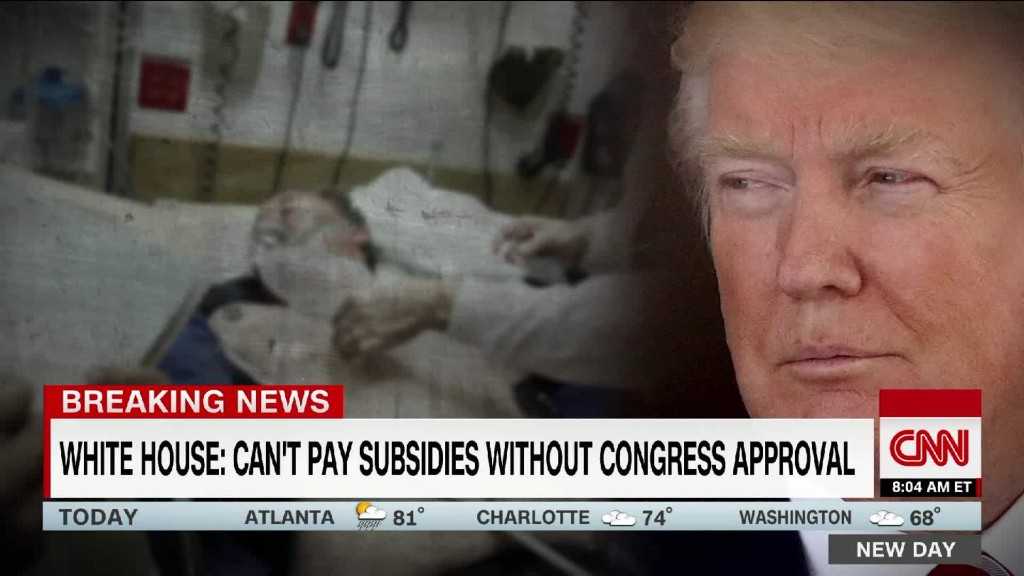
President Donald Trump and his administration are taking steps to lower premiums, increase choice and foster competition in the health insurance market. All of that sounds good -- until one realizes that the changes are coming largely at the expense of millions of Americans with pre-existing conditions.
The administration has issued two proposed rules in recent months that will allow more people to sign up for alternatives to Obamacare. But the actions are expected to mainly help younger and healthier consumers, while hurting those with spottier health histories.
That's because the proposed regulations, combined with Congress' elimination of the individual mandate next year, will whittle away at Obamacare's sweeping protections for those with pre-existing conditions. This will leave those who are or who have been sick at risk of paying higher premiums, losing their comprehensive coverage or being left without an insurer on the Affordable Care Act exchanges.
"The end result is that you will have two markets," said Sabrina Corlette, research professor at Georgetown University's Health Policy Institute. "One that's for young and healthy individuals who don't need a lot of health care, and another that will provide comprehensive coverage for people with pre-existing conditions, but will be much more expensive."
Obamacare revolutionized health insurance for people with pre-existing conditions. Under the health reform law, insurers could no longer deny coverage to consumers because of their medical history or base premiums on it. Also, carriers were required to cover 10 essential health benefits, including maternity care, mental health services and prescription drugs.
These provisions were among Obamacare's most popular reforms, but they were also one of the main reasons why coverage on the individual market became so pricey. That has made these protections a target.
Shortly after Congress abandoned its attempt to repeal and replace Obamacare in late September, Trump issued an executive order that he said would give millions of Americans more access to affordable coverage. The president's directive laid the foundations for the two proposed rules.
The first one, unveiled in early January, would make it easier for small businesses to band together based on their industry or location and buy coverage through so-called association health plans.
The proposal would allow association plans to be regulated in the same way as large employer plans. That would free them from having to adhere to all of Obamacare's rules, particularly the one requiring insurers to offer comprehensive coverage. So these plans would likely have lower premiums, but also provide fewer benefits -- which could leave sicker and older workers out in the cold. Also, the offerings could be less attractive to young women if they don't cover maternity benefits.
Related: Trump officials unveil rule that could chip away at Obamacare
The proposed regulation would also allow associations to base rates on gender and age, which could leave younger men paying less but older workers and women saddled with higher rates. Currently, the Affordable Care Act bans basing premiums on gender and limits the amount that can be based on age. However, plans would not be allowed to set premiums based on workers' health status.
If the proposed rule is finalized in coming weeks, premiums for Obamacare policies would rise 3.5% to an average of $15,000 a year, largely because healthier enrollees would opt for association plans, according to a new study by Avalere Health, a consulting firm. Those buying the new small business plans would pay $5,300, on average.
"The proposed rule would lead to millions of individuals and small businesses shifting into a new form of coverage, likely reducing their premiums, but leading to higher premiums in the markets they leave behind," said Chris Sloan, senior manager at Avalere.
The administration's second proposed regulation, which was released last week, will make it easier to obtain coverage through short-term health insurance plans by allowing insurers to sell policies that last just under a year. The proposal would reverse an Obama administration decision to limit the duration of short-term health plans to no more than 90 days in order to make them less attractive.
Short-term plans are allowed to exclude those with pre-existing conditions and can base rates on an applicant's medical history. They don't have to offer comprehensive coverage and they can impose annual or lifetime limits on benefits, meaning they may only pay out a set amount -- often $1 million or less -- leaving the policyholder on the hook for the rest. Also, they don't have to cap the amount consumers have to pay in deductibles and co-pays every year.
Related: Trump administration unveils alternative to Obamacare
Consumers today can find short-term plans that cost as little as 20% of the least expensive Obamacare plan, according to the Kaiser Family Foundation. Once short-term plans are available, healthy people may turn to them instead of Obamacare policies, pushing up the rates for those who remain on the exchanges.
Congress' elimination of the individual mandate could also hurt those with pre-existing conditions, particularly those who don't qualify for federal premium subsidies, health policy experts say. Without the mandate, which requires nearly all Americans to get coverage or pay a penalty, healthy people will have less incentive to enroll. So premiums for those left on the exchanges are likely to rise.
Even more concerning, experts are waiting to see whether insurers want to remain on the exchanges in 2019 if policyholders are older and sicker. For a while last year, it looked like tens of thousands of people could have had no choice of insurer in 2018 as carriers dropped out amid all the uncertainty in Washington D.C. However, state officials were able to convince insurers to cover all the so-called bare counties before open enrollment began in November.


